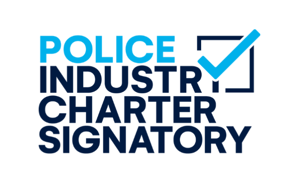CDS signs Police Industry Charter
Posted in Public Sector
April 2024
4 minutes reading time
CDS is proud to announce that it has signed the Police Industry Charter to formalise our commitment to the standards and principles for collaboration set out for UK policing and the technology industry.
The Police Industry Charter is managed and monitored by BlueLight Commercial in conjunction with the National Police Chief’s Council (NPCC), Association of Police and Crime Commissioners (APCC), the Home Office and the Office of the Police Chief Scientific Adviser.
The charter has been signed by leaders across UK policing which include:
- Gavin Stephens QPM, Chair, National Police Chief’s Council
- PCC Donna Jones, Chair, Association of Police and Crime Commissioners
- Professor Paul Taylor, Police Chief Scientific Adviser
- Sir Matthew Rycroft, Permanent Secretary, Home Office
- Lianne Deeming CEO, BlueLight Commercial
- Dame Julie Kenny, Chair, UK Security and Resilience Industry Suppliers Community
The purpose of the charter
- Promoting a culture of open dialogue between policing and industry on evolving challenges and opportunities.
- Expanding the opportunities for reciprocal leadership development across policing and industry, in particular in relation to risk management, public engagement, crisis management, workforce management, digital transformation, and agile delivery.
- Increasing the return on investment for products and services developed by industry and consumed by UK policing. Supporting the delivery of policing’s modern, competitive science and technology infrastructure.
- Increasing the opportunity for police officers and staff members to develop critical and niche skills in collaboration with industry subject matter experts, and for industry to better understand the roles and requirements across policing.
- Aligning industry to the principle of system and product interoperability as a core fundamental design requirement. Improving policing’s ability to provide enhanced services to the public, more quickly, by driving constant innovation in the market.
- Supporting policing in harnessing science and technology which creates efficiency and capacity in the system, allowing policing to deliver an increasing quality of service to the public.
- Building further transparency into the police and industry relationship by making public the principles by which we agree to operate against.
- Supporting and enabling the parts of the system local to national who are responsible for product design, skills development, commercial engagement, and implementation.
- Encouraging reciprocity by placing equal emphasis on both industry and policing to adhere to the principles in order to be successful.
CDS and Policing & Criminal Justice
CDS has a long history of working within UK policing – going back to 2013 when we created an intranet for the Metropolitan Police Service, the success of which led to us redeveloping their public-facing website which allowed members of the public to report crimes online for the first time.
In 2018, the base solution became Single Online Home (SOH), conceived as the ‘front desk’ to the UK’s digital police station which would provide a much-needed information source and reduce pressure on local police stations and the 101 contact centres. As of March 2024, CDS has onboarded 41 of the 43 Home Office police forces in England and Wales to the platform which continues to give access to a range of services and information related to policing and criminal justice, as well as allowing the reporting of crimes.
Single Online Home is considered critical, national digital infrastructure and has been compared to the introduction of the 999 number in terms of the positive impact of the service transformation, and the benefit to citizens.
SOH allows each police force to create an experience tailored to the needs of that force and region while providing a consistent look and feel.
CDS is very proud that the platform has experienced 100% uptime and is available 24/7. We have an evolving programme of platform and feature improvements to continually meet current and future best practice standards, including those for accessibility and resilience from cyber-attacks.
Complex Case Management and Policing
Nowhere is the need for effective case management greater than within policing and associated national bodies. Over the last two years, CDS has developed a Low-Code practice utilising the industry-leading Appian platform to build a case management system for the Independent Office for Police Conduct (IOPC). We are also currently building a new Digital Forensics case management system for a UK police force. Digital forensics has become a critical target area for transformation given the importance of evidence quality, governance and auditability that can be challenging with traditional processes.
The benefit of this Low-Code approach over commercial off-the-shelf software is the ability it gives to build a bespoke solution for the client with minimal coding, and frankly revolutionary speed to value. It is also continuously upgradeable, with new features and requirements able to be met at pace and without the need to continuously force a system designed to do something else, to do something new.
We are next turning our attention to The College of Policing where we are working collaboratively to implement a data modernisation strategy and the application of Ai at enterprise scale to enhance the core activities of the college.
Matt Johnson, Head of Public Sector at CDS sits on the Justice and Emergency Services Committee for TechUK
Matt is delighted that CDS has signed the charter.
“I very much welcome the introduction of the Police Industry Charter, it aligns strongly with the work we do at CDS and our wider purpose to make a positive difference, within policing as well as the rest of the public sector. I’m really pleased that CDS has signed the charter and would recommend other tech suppliers adopt the principles and sign up too.”
Matt Johnson
Head of Public Sector, CDS

